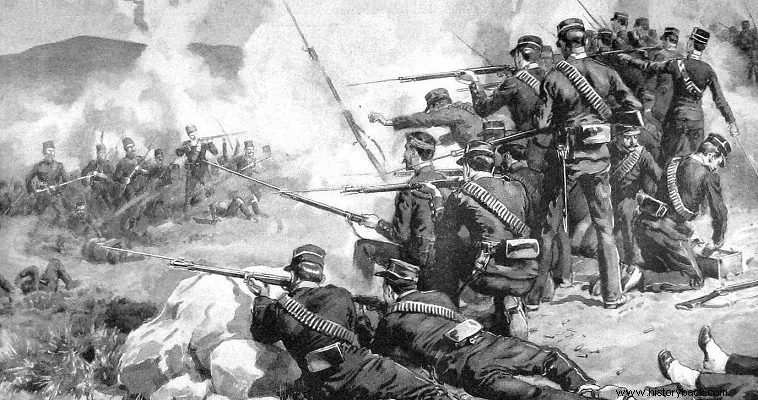
Greece and Turkey (Ottoman Empire) clashed, unofficially, several times after the revolution of 1821. The great crisis finally broke out with the explosion of the new Cretan revolution, in 1896. In February 1897, the Greek government sent to Crete a mixed detachment under the command of colonel Timoleon Vassos. The small regular Greek forces, in cooperation with the Cretan rebels, managed to inflict serious blows on the enemy.
Despite Greece's substantial involvement, the Ottoman Empire did not immediately declare war on Greece. At the end of March 1897, however, the invasion of Macedonia by a body of 2,500 volunteers of the National Society, gave the Turks the reason to advance.
The Greek Army had been mobilized since February 15. Three divisions were formed, two in Thessaly and one in Epirus. The divisions in Thessaly (I and II) formed the Army of Thessaly, 40,000 strong and 96 cannon, under the command of the heir to the throne Constantine. But there was NO plan of action and the supreme command seemed unable to impose its authority and to stop even the heads of formations, who refused to comply with its directives-orders.
The 1st Division was under the command of Lieutenant General Nikolaos Makris. The head of its 2nd Brigade was colonel Christos Mastrapas. Mastrapas was a typical example of a senior officer of the time who had won points not in the camps but in parliament and political offices.
Born in Dorida in 1836, he entered the School of Evelpides in 1858 and graduated in 1861 with the rank of lieutenant. Three years later he was elected a member of parliament despite being an active officer, having reached... strangely enough, already the rank of captain. From that moment on, Mastrapas moved between the parliamentary seat and the army as needed, also taking over as Minister of Military, for a few months, in 1892, in a caretaker government.
In 1897 he was 61 years old. Although an MP since 1895, he returned to service to command the 2nd Brigade of the 1st Division. He was one of the protagonists of the defeat in the so-called "Border Battle" (April 6-11, 1897), commanding his brigade in a tragic way, conveying defeatism and causing confusion with his orders and counter-orders to his men and his superiors.
He ordered retreats without any reason, apparently due to his own panic and inexperience. Thanks to Mastrapa, critical territory was abandoned without even Turkish pressure. Together with the 70-year-old Makris, they arbitrarily decided that the army was not under disbandment, but without attempting to regroup it.
Later he arbitrarily retreated to Larissa. The crown prince ordered him to counterattack and recapture the lost positions, but he simply deployed defensively below… When, later, he was asked to assist the Engineer in causing an artificial flood in a stream in the area to stop the Turkish advance, he refused any assistance.
Together with Makris, they formed a disastrous duo for the development of operations during the border battle. Makris and Mastrapas were sending desperate messages of destruction to the headquarters, at a time when the Turks had not even breached the Greek defensive positions. The bad thing was that the heir did not bother to be informed personally. The later general Theodoros Pangalos characterized Mastrapas as "unlearned, lifeless, lacking in basic tactical education".
